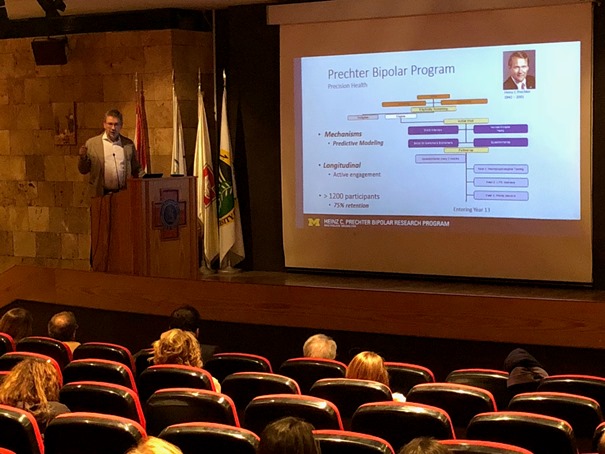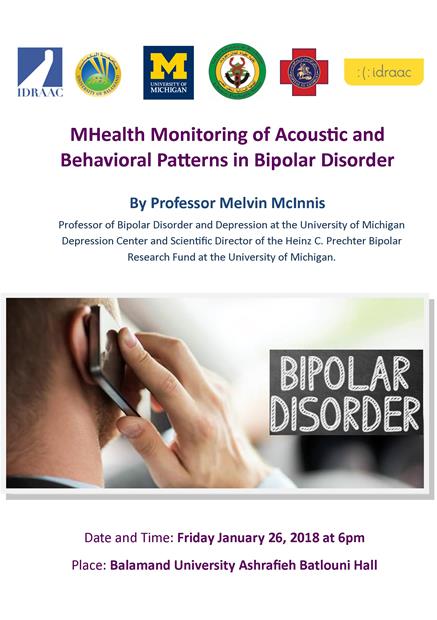IDRAAC, in collaboration with the Department of Psychiatry and Clinical Psychology at the St Georges Hospital University Medical Center, the Faculty of Medicine at the Balamand University and the Lebanese Psychiatric Society, organized a conference titled “MHealth Monitoring of Acoustic and Behavioral Patterns in Bipolar Disorder”. The conference, held at the Balamand University-Ashrafieh, presented an innovative approach, which is the subject of a current research project involving the University of Michigan and IDRAAC, which uses a cell phone-based system to detect subtle changes in speech of bipolar disorder patients allowing to predict subsequent risk for mood changes.
After introductory remarks by IDRAAC’s president Dr. Elie Karam, Professor Melvin G. McInnis, one of the most prominent researchers on bipolar disorder and depression in the world, presented the research project. Professor McInnis, who is the Professor of Bipolar Disorder and Depression at the University of Michigan Depression Center and the scientific director of the Bipolar Research Fund at the University of Michigan, is internationally known as an expert in the diagnosis, genetics and clinical management of bipolar and depressive disorders in adolescents and adults.
Professor McInnis explained that Bipolar disorder is a psychiatric illness with pathological disruptions of emotion, cognitive and motor capacity. There is a periodicity of the illness pattern that oscillates between a manic energized state with charged emotions and pressured rapid speech to a depressed emotional phase with retarded movements and inhibited quality and quantity of speech. He added that the successful management of patients with mood diseases such bipolar disorder requires an approach for ongoing monitoring that can track evolving health and mental states and alert the individual as well as caregivers before adverse changes in mood states and psychiatric diseases states occur to cause substantial impairment.
Currently, this approach is clinical and depends on regular patient / care provider interaction to assess the course of illness and anticipate clinical changes and needs. There are limited technologies that address the challenge of monitoring individuals long-term in an ecological manner, unobtrusive and integrated seamlessly into their daily routine consistently over time.There is a relative absence of existing technologies that satisfy the varied requirements of this challenge, further, there is a relative absence of long-term research that correlates physiological changes with clinical course.
Professor McInnis revealed that IDRAAC, which has been conducting mental health research in Lebanon for the past 30 years, is undertaking an NIH-funded study with the University of Michigan in the USA to assess an innovative approach to bridge this gap by developing a practical solution to assist in the longitudinal management of bipolar patients. “We propose achieving this through the exploration of information in temporal patterns of speech captured on a daily basis by a cell phone-based system and analyzed using sophisticated algorithms”, he explained.
According to Professor McInnis, the implications of this work are profound at the local and global level in the care and management of psychiatric disorders. This technology will provide for the prioritization of patients for medical and psychiatric care based on the early detection of change patterns in voice and speech. Changes in speech patterns are highly reflective of underlying mood shifts and a critical component of the clinical exam. The ability to detect subtle changes in speech that predict subsequent risk for mood changes would be a substantial advance in preventive care.
You can check the details of this collaboration on the following link.
You can check the media coverage of the conference on the following link.


